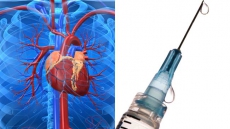In pioneering research, a scientist has developed a 'simulated' human heart to test the effect of drugs on the heart without using human or animal trials.
The breakthrough by Helen Maddock, a British expert in cardiovascular physiology and pharmacology from Coventry University, could save hundreds lives and improve treatment therapies in near future.
Maddock's 'in vitro' technique (performed in lab) uses a specimen of human heart tissue attached to a rig allowing the muscle to be lengthened and shortened while being stimulated by an electrical impulse - mimicking the biomechanical performance of cardiac muscle.
Trial drugs can then be added to the tissue to determine whether or not they have an adverse effect on the force of contraction of the muscle (and therefore of the heart).
"This 'simulated' cardiovascular system provides the most realistic model of heart muscle dynamics in the world to date," Maddock noted.
It opens up unprecedented possibilities for identifying negative effects of drugs early and inexpensively.
Maddock has formed a spin-out company - InoCardia Ltd - from Coventry University to begin implementing her groundbreaking technique in the pharma industry.





